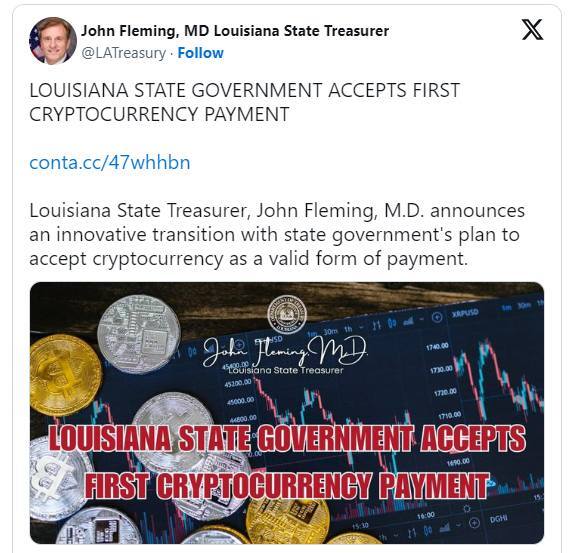In a historic step towards modernizing financial transactions, the Louisiana state government has officially begun accepting cryptocurrency payments for various state services. This innovative initiative marks a significant shift in how public institutions approach technology and finance, reflecting a growing trend among governments worldwide to integrate digital currencies into their operations..
The Move Toward Cryptocurrency Adoption
The acceptance of cryptocurrency payments by the Louisiana state government is a response to the increasing popularity of digital currencies among citizens and businesses. As cryptocurrencies like Bitcoin and Ethereum gain traction, states across the U.S. are exploring ways to incorporate these assets into their financial systems. Louisiana’s initiative positions it as a forward-thinking state, ready to embrace technological advancements that could enhance efficiency and convenience for its residents.
Why Cryptocurrency?
- Convenience: Cryptocurrency payments offer a fast and seamless way for residents to settle transactions. With the rise of digital wallets, users can complete payments instantly, bypassing traditional banking delays.
- Cost-Effectiveness: Accepting cryptocurrency can reduce transaction fees associated with credit card payments and bank transfers. This could potentially save the state money in processing costs.
- Increased Participation: By accepting cryptocurrencies, the state may attract a younger demographic that prefers digital currencies for transactions, encouraging greater civic engagement.
- Transparency: Blockchain technology, which underpins cryptocurrencies, provides an immutable record of transactions. This can enhance transparency in government financial operations, fostering trust among citizens.
Implementation Details
The implementation of cryptocurrency payments in Louisiana is a carefully structured process. Here are key aspects of the initiative:
1. Pilot Programs
The state government has initiated pilot programs across various departments to test the feasibility of accepting cryptocurrencies. These pilot programs will evaluate user experiences, transaction speeds, and integration with existing financial systems.
2. Partnerships with Blockchain Companies
To facilitate this transition, Louisiana has partnered with established blockchain companies that specialize in payment processing. These partnerships are crucial for ensuring secure and efficient transactions, as they leverage the expertise of firms experienced in handling digital currencies.
3. Payment Options
Residents can now pay for select state services using popular cryptocurrencies. While specific details may vary by department, options are likely to include well-known currencies such as Bitcoin, Ethereum, and potentially others, depending on market trends and user demand.
4. Regulatory Compliance
The state government is committed to complying with all relevant regulations governing cryptocurrency transactions. This includes adhering to anti-money laundering (AML) and know-your-customer (KYC) requirements to ensure that the initiative operates within legal frameworks.

Services Available for Cryptocurrency Payments
The Louisiana state government has identified a range of services eligible for cryptocurrency payments. These may include:
- Motor Vehicle Registration: Residents can pay for vehicle registration fees using cryptocurrency, streamlining the process for vehicle owners.
- Permit Applications: Individuals applying for various permits, including building or fishing licenses, can utilize digital currencies for payment.
- Tax Payments: The state is exploring options for accepting cryptocurrency for certain tax payments, further integrating digital currencies into its financial system.
Broader Implications for the State and Beyond
The decision to accept cryptocurrency payments is not just a localized event; it has broader implications for the state and potentially for other governments considering similar initiatives.
1. Economic Growth
By embracing cryptocurrency, Louisiana may attract tech-savvy entrepreneurs and businesses looking to operate in a more favorable regulatory environment. This can stimulate local economies and create new job opportunities within the tech sector.
2. Setting a Precedent
Louisiana’s initiative could serve as a model for other states contemplating cryptocurrency adoption. If successful, it may encourage a nationwide movement toward integrating digital currencies into public sector operations, fostering innovation and modernization.
3. Public Education and Awareness
As part of this initiative, the state government plans to educate its citizens about cryptocurrency and blockchain technology. Increased awareness will empower residents to make informed decisions about using digital currencies, contributing to a more knowledgeable and engaged electorate.
Challenges and Considerations
While the acceptance of cryptocurrency payments offers numerous benefits, several challenges and considerations must be addressed:
1. Volatility of Cryptocurrencies
The inherent volatility of cryptocurrencies poses risks for both the state and its residents. Fluctuations in value could affect transaction amounts and budgeting processes. To mitigate this, the state may choose to convert received cryptocurrencies into fiat currencies promptly.
2. Regulatory Landscape
Navigating the regulatory landscape surrounding cryptocurrencies can be complex. The state must remain vigilant in adapting to changing regulations at both the state and federal levels to ensure compliance.
3. Security Concerns
As with any digital transaction, security is paramount. The state must implement robust security measures to protect against potential cyber threats and ensure the integrity of its financial systems.
Conclusion
The Louisiana state government’s decision to accept cryptocurrency payments for state services is a groundbreaking move that reflects a broader trend towards the integration of digital currencies into everyday transactions. By embracing this innovative approach, Louisiana positions itself as a leader in the adoption of modern financial technologies.
As the state rolls out this initiative, it has the potential to enhance convenience, reduce costs, and promote transparency in government operations. While challenges remain, the commitment to exploring cryptocurrency payments signals a progressive outlook on the future of public finance.
In a rapidly changing financial landscape, Louisiana’s initiative may well inspire other states to follow suit, paving the way for a new era of digital engagement in the public sector. As residents become increasingly comfortable with cryptocurrencies, this shift could redefine how state services are accessed and paid for, ultimately benefiting both citizens and the government alike.










